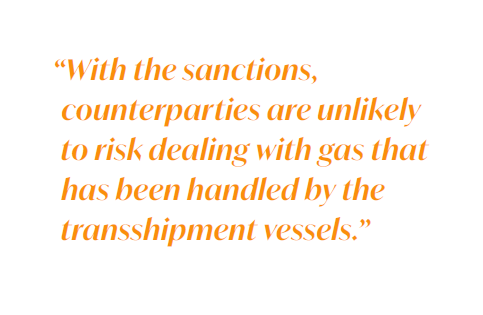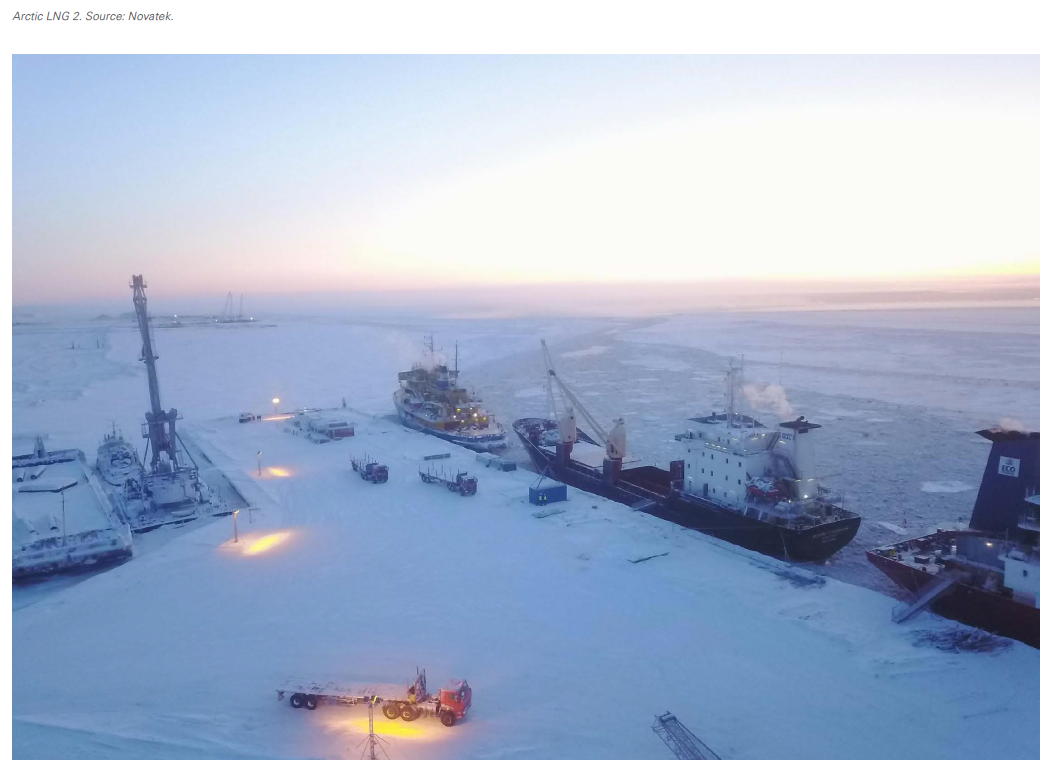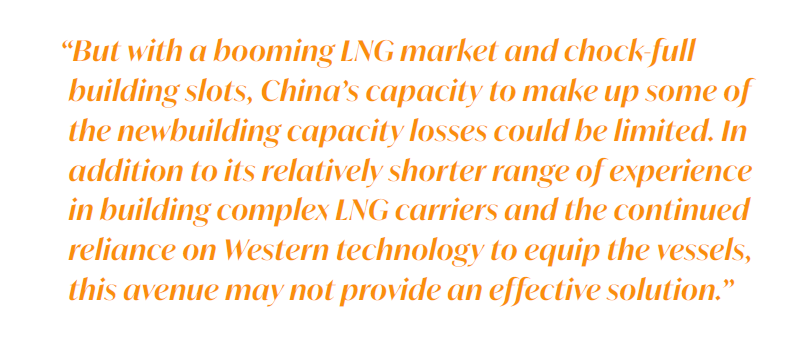Sanctions chip away at Russian Arctic LNG projects [Gas in Transition]
Russia has a stated goal of boosting LNG production capacity to 140mn tonnes/year and take up to 20% of global market share by 2035, with much of this expansion expected to come from its Arctic projects.
There have however been concerns recently about the effect of Western sanctions on Russia's ability to carry out its planned expansion due to a shortage of LNG carriers to transport the fuel.
While the transportation issues are part of the problem, the root cause runs much deeper, with the sanctions seen having wide ranging effects on the Arctic LNG-2 project in particular, as well as the potential for Russia to further develop its other planned Arctic LNG production facilities.
A long-running series of sanctions has caused a two-pronged problem. The most recent sanctions involve measures aimed specifically at the two floating storage units that are a critical part of the export infrastructure for Arctic LNG-2.
In September, the US State Department sanctioned the operating companies behind the FSUs Saam and Koryak, meant to transship LNG from the project at the western and eastern ends of the Northern Sea Route at Murmansk and Kamchatka respectively.
Using a tried and tested model from the earlier Yamal LNG project, Arctic LNG-2 operator Novatek had planned to use high-spec, ice-class LNG carriers to ferry exports to the FSUs, from which they would then be transshipped to more widely available and lower cost conventional tankers.
Hitting where it hurts
However, with the sanctions, counterparties are unlikely to risk dealing with gas that has been handled by the transshipment vessels.
This means that the ice-class LNG carriers serving the plant will now likely have to go all the way to their destinations to deliver the fuel, thus increasing voyage time and utilisation, and decreasing availability as a result.
 The vessels might have to bypass the FSUs and ship Arctic LNG-2 volumes the whole way to end markets, said Rystad Energy senior vice-president for Gas & LNG Market Research Xi Nan. "This would put future offloading activities at risk (and) given the sanctions on the FSUs, the first train would be constrained with LNG loading," she added.
The vessels might have to bypass the FSUs and ship Arctic LNG-2 volumes the whole way to end markets, said Rystad Energy senior vice-president for Gas & LNG Market Research Xi Nan. "This would put future offloading activities at risk (and) given the sanctions on the FSUs, the first train would be constrained with LNG loading," she added.
The second part of the problem is the effect that sanctions are having on the supply of equipment to facilitate the expansion of LNG exports.
The primary effect is on the building of the ARC7 LNG carriers to support the exports, especially the ones contracted to non-Russian yards. There has been speculation that Samsung Heavy Industries, the main builder of some of these contracted newbuildings, has pulled out of the contract.
Contracts to build 21 vessels to fulfil the transport needs of Arctic LNG-2 had been signed as far back as 2019. Brand new Russian shipyard Zvezda in Vladivostok was reportedly awarded the contract to build 15, in conjunction with SHI while the remaining six were to be built by Daewoo Shipbuilding and Marine Engineering, now taken over by the Hanwha Group and rebranded Hanwha Ocean.
There are varying reports on the fate of these orders. SHI was to build 10 of the vessels as well as five hulls while assisting Zvezda in completion of the vessels.
Local media reports in August suggested work on these 10 had stopped. The six-vessel contract at Hanwha Ocean had also reportedly been cancelled.
Meanwhile in October the Russian government extended the maturities on the loans for the construction of the five Zvezda-constructed vessels from 2024 to 2027, suggesting the vessels which were due to be delivered in the second half of 2023 would be delayed. In fact, Russian media reported as far back as December 2022 that the vessels would not be able to be delivered till 2024 at the earliest.
Other reports however cite Hanwha Ocean officials saying that three vessels will be ready by the end of the year, while there have been sightings of at least six vessels at high stages of completion at the respective shipyards in South Korea and Vladivostok.
As well, it is unknown what the fate of Mitsui OSK Lines' three-ship order at Guangzhou Shipyard International that was set for first delivery in 2024 is.
If these really are able to begin service by early 2024, they would be perfectly timed to meet the needs of the first train's output. It is estimated that six to seven LNG carriers are needed to service its projected output of 6.6mtpa.
Experts seem less convinced however. "It remains unclear if all of the ARC7 LNGCs will eventually be built," said Rystad's Ms Xi.
A delayed consequence will be the effect that sanctions have on the delivery of key production equipment for the plant itself. While the first train for the project has been completed and is on track to begin production by early next year, there has been speculation that the remaining two trains will face difficulties because of their reliance on Western equipment and technical assistance that has now been sanctioned.
It remains unclear however if the second and third trains will be completed on schedule and if the number of vessels required will increase if they are not able to undertake transshipment operations.
"The first train is expected to start up early next year (but) the timeline of the second and third train could be further delayed," suggested Xi. Continuing uncertainty about sanctions on Western technology to Russia also raises doubts about future capacity expansion. "Project delays should be expected," she said.
Rystad Energy vice-president for Upstream Research Swapnil Babele warned that despite the Russian government's apparent optimism about its upcoming LNG projects, seen with the approval of the 20.4mn-mt/yr Murmansk LNG project in October, domestic capabilities remain limited.
"In the absence of foreign service providers, Russia is accelerating development of its domestic LNG technology and investing in R&D," he said. Mr Babele however pointed to the significant technical challenges Novatek faced with its newly patented Arctic Cascade Modified process as an example of the challenges ahead.
"As a result, we expect it will not be an easy task for Russia to develop effective LNG capabilities in the short term. Overall, uncertainty over new LNG projects has increased," he added.
Limits of Chinese support
This circles back to the question of Russia's LNG production ambitions and the dilemma its potential clients face.
China is already one of the largest buyers of Russian LNG and has a vested in ensuring security of supply. According to the Centre for Research on Energy and Clean Air, since December 2022, China was the second largest importer of Russian LNG, taking 23% of its exports.
Its manufacturers have somewhat more experience in building the equipment Russia needs and could theoretically plug the gaps. But with a booming LNG market and chock-full building slots, China’s capacity to make up some of the newbuilding capacity losses could be limited.
In addition to its relatively shorter range of experience in building complex LNG carriers and the continued reliance on Western technology to equip the vessels, this avenue may not provide an effective solution.
State-owned shipyard group China State Shipbuilding Corp. has at least three yards with experience in building LNG carriers, led by Hudong-Zhonghua Shipbuilding. However, even the latter is only just beginning to get into the high-spec vessels that the South Koreans have much longer and better experience in building.
Likewise, while Chinese fabricators such as Bomesc Offshore Engineering, Cosco Shipping Heavy Industry, Penglai Jutal Offshore Engineering, Wison Offshore Engineering and Qingdao McDermott Wuchuan have worked on modules for Arctic LNG-2, this has also been affected by sanctions in the past and their reliance on Western technology also raises concerns about future work.
And even the Chinese have limits as to how far they would be prepared to stick their necks out to supply Russian companies faced with the threat of sanctions.
Xi said that while "it’s reasonable that Russian yards work with Chinese shipbuilding partners, again, sanctions make things uncertain. I would doubt that Chinese yards could de-bottleneck Russian vessel newbuilds."
Clients are meanwhile destined to be caught in a quandary.
Most of Arctic LNG-2's relatively minor long-term offtake agreements are with Chinese partners. It is in their interests to help facilitate access to the competitively-priced Russian LNG that they crave but they will not do so at the risk of jeopardising their business interests.
It is known that deals have been signed with ENN LNG, Zhejiang Energy and Shenergy Group, as well as the partners involved in the project, namely TotalEnergies, Petrochina, CNOOC and the Japanese consortium of Mitsui and JOGMEC. With most of these contracts with Asian partners, including China, these would also be subject to the vagaries of Sino-US relations.
"The majority of the Arctic LNG 2 volumes are expected to go east to Asia," said Xi and suggested that these companies might apply for exemptions from the US Office of Foreign Assets Control if necessary.



